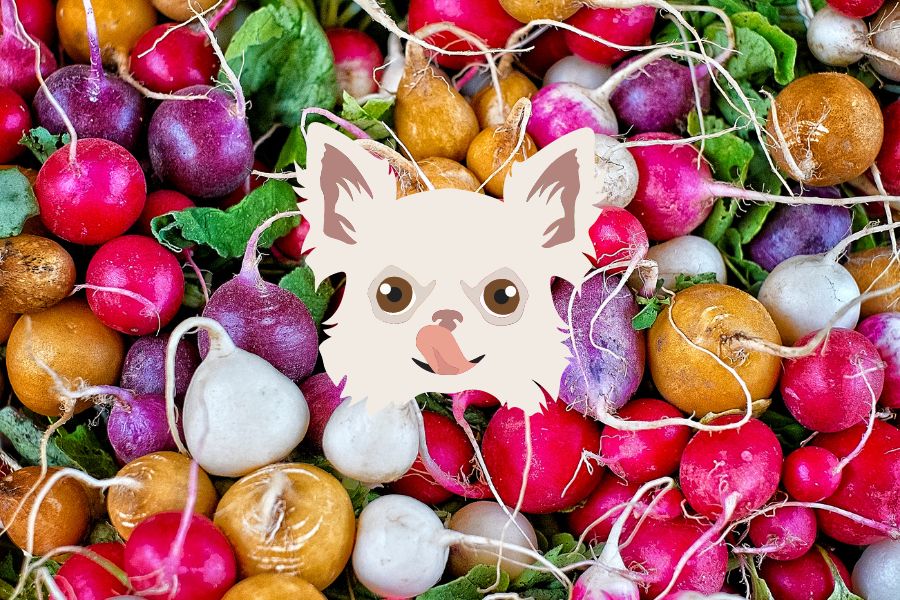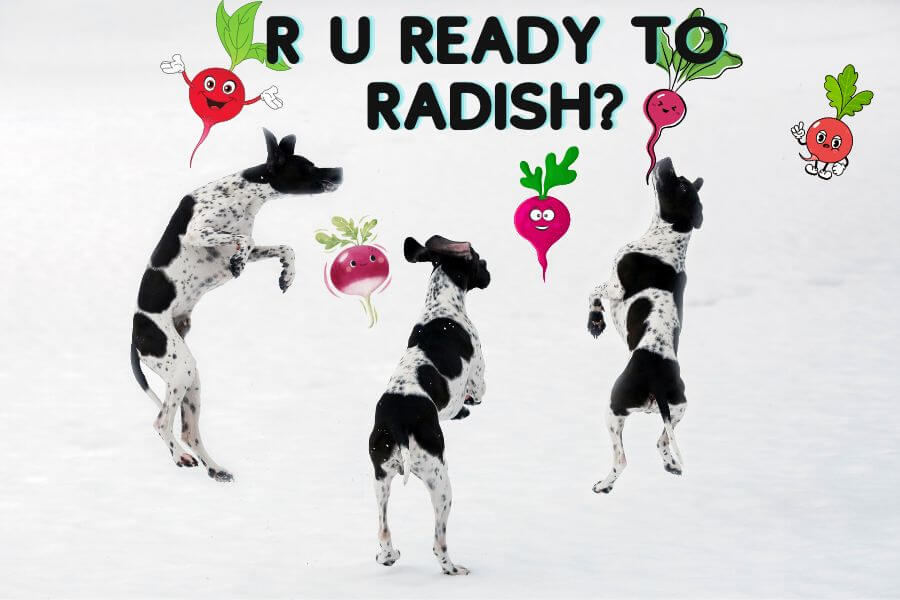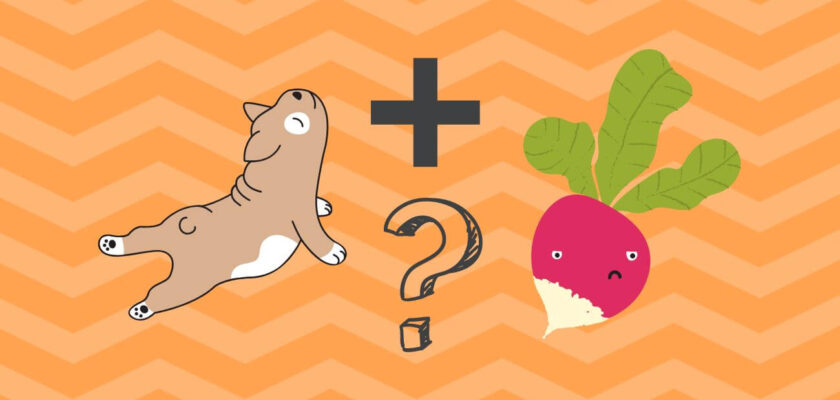Radish is a crunchy root vegetable that is related to the cabbage and broccoli family. It grows underground and has a long, white, tapered root. People use it mostly for salads, but it is also eaten cooked. But can dogs eat radishes, too? Let’s find out!
Key Takeaways
- Radishes are healthy, nutritious vegetables that offer various benefits for dogs, including boosting the immune system and aiding in digestion. ✔️
- Radishes that are safe for dogs include red globe radishes, watermelon radishes, cherry belle radishes, French breakfast radishes, and Pablo Radish. ✔️
- There are some health risks associated with feeding radish to dogs, such as gastrointestinal problems and toxicity.🚫
- Radish leaves are not poisonous to dogs but can cause gastrointestinal upset if consumed in large quantities.🚫
Health Benefits of Radishes for Dogs
Radishes are healthy, nutritious vegetables. They have many benefits for your dog. For example, they’re a great source of:
- vitamin B-complex, which helps the body convert food into energy, and also helps keep the nervous system working properly;
- vitamin C, which boosts the immune system, helps the body fight infection, and keeps wounds healing properly;
- vitamin K, which is important for healthy blood clotting, and is also essential for the development of bones and other tissues in growing puppies;
- potassium, an important mineral for dogs that helps regulate fluids and mineral balance in the body;
- magnesium, which is important for strong bones, normal heart function, and healthy blood pressure;
- manganese, a mineral that is important for the development of strong bones and connective tissues, also helping the body process carbohydrates, protein, and cholesterol;
- zinc, which is important for the immune system, growth, and reproduction. It also works hand in hand with the vitamin C by supporting wound healing.
All those nutrients offer various health benefits for dogs, including boosting the immune system, aiding in digestion and preventing cancer. Additionally, radishes are a low calorie food that can help overweight or obese dogs lose weight gradually without putting their health at risk.
Risks of Feeding Radishes to Dogs

So far, we’ve talked about the benefits of feeding your dog radish. However, there are some health risks associated with feeding radish to dogs.
Large amounts of raw radish can cause gastrointestinal problems such as diarrhea and vomiting due to its high fiber content.
Additionally, certain types of radish (like black Spanish) contain nitrates, toxins that can be harmful to dogs. Nitrates are a type of chemical that is found in some vegetables, including radishes. When these vegetables are eaten, the nitrates are converted into nitrites. Nitrites can be toxic to dogs and can cause health problems, such as blue baby syndrome.
Therefore, it is important to only give your dog radishes that are safe for them and to always check with your veterinarian if you are unsure. The kinds of radishes that are safe or unsafe for dogs will be discussed in the next paragraph.
Radish Varieties That Are Good for Dogs
Can dogs eat radishes? Yes, but not all radishes are created equal. The following list contains some safe and healthy radish varieties for canine consumption:
- Red globe radishes;
- Watermelon radishes;
- Cherry Belle radishes;
- French breakfast radishes;
- Pablo Radish (a variety developed specifically for pets).
If you’re looking to add some nutritious and delicious radishes to your dog’s diet, any of the varieties listed above would be a good choice.
Radish Varieties You Want to Keep Your Dog Away From

However, it’s important to note that not all radishes are safe for dogs. Those are listed below.
- Spanish radish;
- wild radish.
These varieties contain high levels of nitrates. Excessive consumption of nitrates can cause health problems in dogs, so it’s best to avoid feeding your pet these types of radishes.
Parts of Radishes Dogs Can Eat
Generally speaking, dogs can eat the root of a radish with no issue. The root is the part of the plant that grows underground, and it is this part that is typically eaten by humans. However, it is important to keep an eye on your dog if they are eating radishes, as too much of the vegetable can cause stomach upset.
How to Prepare Radish for Dogs?
Radish can be fed to dogs either raw or cooked. If feeding it raw, it is important to wash the radishes thoroughly to remove any dirt or pesticides. Cooked radish may also be a better option for dogs who have sensitive stomachs than raw radish. They can then be chopped into small pieces and given to your dog as a snack or added to dog food. If cooking, simply boil or steam the radishes until they are soft and then give them to your pup. Simple as that!
Can Dogs Eat Radish?

So, can dogs eat radishes? Overall, the health benefits of feeding radish to dogs outweigh the risks, especially if you stick to healthy varieties of this vegetable. Radish is a great way to add some nutritional value to your pet’s diet and can help keep them healthy and happy! If you’re looking for a nutritious vegetable that’s safe for dogs, consider giving them radish! That’s raaaadddd!!!🤪
This vegetable is packed with vitamins, minerals and other nutrients that offer a range of health benefits for dogs. However, be sure to only give your dog radishes that are safe for them and consult with your veterinarian if you have any questions. Thanks for reading!
| PROS | CONS |
|---|---|
| Radishes are a great source of vitamin C, which is important for dogs with gum disease and teeth issues. | Radishes can be hard on your dog’s stomach. |
| They’re low in calories, which can help your dog maintain a healthy weight. | Radishes can cause gas if eaten in large quantities by dogs who are lactose intolerant or have sensitive tummies. |
| A lot of dogs really love the taste of radishes! They’re a great alternative to other snacks that might be less healthy for your dog, like cookies or chips. | Radishes contain oxalates, which can lead to calcium oxalate bladder stones in dogs. |
| Radishes contain antioxidants that help fight off cancer cells and slow down aging. | Radishes can contain harmful nitrate, as well as pesticides. |
Frequently Asked Questions
What Happens If My Dog Ate a Radish?
Radishes are not toxic to dogs, however some dogs may experience gastrointestinal upset if they eat too many radishes. If your dog ate a radish, watch for signs of vomiting or diarrhea. If your dog experiences these symptoms, contact your veterinarian.
How Many Radishes Can a Dog Eat?
The amount of radishes a dog can eat depends on the size of the dog. A small dog may only be able to handle a few radishes, while a large dog could potentially eat an entire bunch. Generally speaking, treats like radishes shouldn’t make up more than 10% of a dog’s diet.
Are Radish Leaves Poisonous?
Radish leaves are not poisonous to dogs. However, they can cause gastrointestinal upset if consumed in large quantities. If your dog consumes radish leaves, monitor them for symptoms such as vomiting or diarrhea. If they experience any of these symptoms, contact your veterinarian.
Can Dogs Eat Radish (White)?
White radish, also called daikon, is a long white root vegetable. White radish is not toxic to dogs, and dogs can safely eat small amounts of it. If your dog does not have any health problems (such as a sensitive stomach), you can feed them small amounts of white radish as a treat.
What Animals Like to Eat Radish?
Rabbits, deer, squirrels, and chipmunks enjoy eating radishes. Chickens will also peck at them if given the chance. Some rodents, like gerbils and rats, can have a radish as part of their diet, but too much may give them stomach upset.
Similar Posts:
- Can Dogs Eat Broccoli? Is This Vegetable Good for Dogs?
- Can Dogs Eat Lettuce? The Pros and Cons & How to Make It Safe for Dogs
- Can Dogs Eat Yams? Are They the Same as Sweet Potatoes?
- What Vegetables Can Dogs Eat? Our List of Best Vegetables Dogs Can Eat
- Can Dogs Eat Cabbage? The Ultimate Guide for Dog and Cabbage Lovers
- Can Dogs Eat Dragon Fruit?
- Can Dogs Eat Bell Peppers? How to Feed Your Dog Peppers Safely
- Can Dogs Eat Eggplant?

